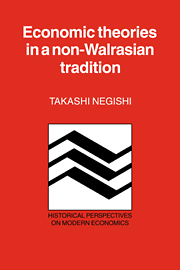1 - Anti-neoclassical or non-Walrasian economic theories
Published online by Cambridge University Press: 21 September 2009
Summary
The neoclassical economic theory that is currently predominant should, to be precise, be referred to as Walrasian or neo-Walrasian economic theory, to distinguish it from the Marshallian tradition that was originally designated neoclassical economics (Latsis 1976, p. 86). The aim of this book is to study economic theories of the past that are not directly related to this Walrasian mainstream, so that we can develop boldly new economic theories that are heretical to the currently prevailing theory.
The theories to be studied were once predominant or were influential in some stages of the development of economic science but are now either regarded as having played out their historical roles or else are supported only by a minority of the present economics profession. But this study is not antiquarian, since the theories to be considered raise interesting questions that can be solved with modern techniques. What is of interest is not only what previous economists did do, but also what they did not do. We should not, however, indulge ourselves in an easy victory like a modern army, slipped through time, to overcome a band of medieval knights. We can find in the works of previous economists clues to questions of present interest or techniques of analysis that might be applied to modern problems. It is this possibility that is the motivation for studying the history of economic thought.
- Type
- Chapter
- Information
- Economic Theories in a Non-Walrasian Tradition , pp. 1 - 8Publisher: Cambridge University PressPrint publication year: 1985



